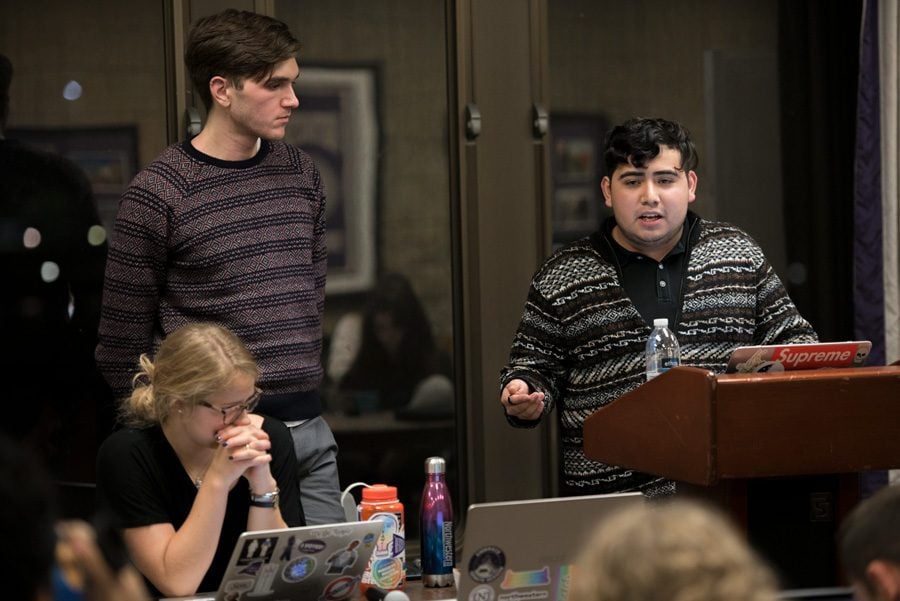ASG’s COVID-19 task force deals with “fallout” of University decisions
Evan Robinson-Johnson/Daily Senior Staffer
Daniel Rodriguez and Campbell Schafer at a previous ASG meeting. Rodriguez and Schafer both contributed to the original resolution.
September 27, 2020
New Associated Student Government President Juan Zuniga said the organization is still “dealing with the fallout” of the University’s decision to cancel in-person classes and close campus housing for underclassmen.
“Our biggest thing right now is ensuring that students have access to the resources they need,” the Weinberg senior said about ASG’s goals for the quarter. “And I can tell you right now that is not the case.”
Zuniga said his immediate goals include creating a fund for students to acquire necessary technology as well as maintaining ASG’s COVID-19 task force that was created during Spring Quarter.
Like many other student organizations, ASG is also currently focused on recruiting new members. The group is accepting petitions to run for Senate and conduct elections over the next few weeks before ASG resumes its Senate meetings in mid-October. During this time, Zuniga said, current ASG members are continuing their work helping students adjust to remote learning, supplementing what the University is doing to help students and minimizing the negative impact of the pandemic.
SESP junior Daniel Rodriguez, ASG’s executive officer of justice and inclusion, said it is “more important than ever” for the organization to aid low-income students and historically marginalized communities, as the impact of the pandemic can disproportionately fall on those groups.
“One of the goals for me and my two deputies is making sure we continue the work that we tried establishing in the spring, which was centering our most marginalized and our most vulnerable communities,” Rodriguez said.
Rodriguez is also a co-chair of the COVID-19 task force, working alongside Academic Chair Campbell Schafer, Analytics Chair Joe Maino and eight other ASG members. The group worked over the summer and will continue into the academic year to manage ASG’s COVID-19 response and advocate for student needs. Schafer said the team met with various administrators over the summer about how the pandemic will affect academics, campus life, student affairs and housing.
“We inserted ourselves to make sure that they were thinking about a lot of important things about student experience that I think some administrators overlooked,” Schafer said.
When professors asked if live or asynchronous lectures were better for students, Maino said the committee recommended a combination of both. Additionally, he said they advocated for more frequent “lower stakes assessments” instead of material-heavy midterms and finals to ease the burden of online learning.
One obstacle ASG members have encountered is that many of their initiatives, such as expanding the Books for Cats program to help students with course affordability, depend on funding from the University. And receiving funds from NU, which is currently in a budget shortfall, adds another layer of difficulty.
“We are going to be reaching out to a lot of student groups and understanding their financial needs,” Maino said. “We have to be very strategic here making sure that what we’re advocating for are things that are really needed since a lot of requests this year, unfortunately, will probably be denied.”
Over the summer, the COVID-19 task force hosted a town hall to gain a better sense of students’ needs. Maino said it led ASG to look into new ways to include international students, along with those living away from campus, in extracurriculars and student life.
For those on campus and in the Evanston area, Zuniga said ASG is looking to find safe ways for students to raise concerns about breaches of COVID-19 guidelines that do not involve the police. Zuniga said he wants there to be accountability measures in place for students who violate COVID-19 guidelines rather than punitive measures.
“We want to make sure that we’re supporting what students want and what students feel is equitable,” Zuniga said. “The biggest role that we have, at least, is to hold Northwestern accountable.”
Email: emilysakai2023@u.northwestern.edu and emmayarger2023@u.northwestern.edu
Twitter: @em_sakai and @emmayarger



